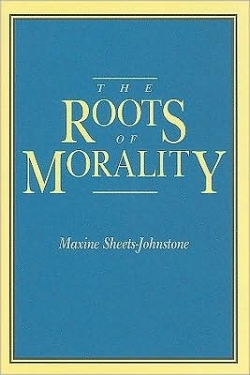
The Roots of Morality
Creativity requires wonder and space: “A brain crammed with information is morally blind.” Maxine Sheets-Johnstone handles weighty philosophy like a dancer: she writes gracefully of the body, movement, creativity, the smile, and vital aspects of play, not just cerebral matter. Author of The Roots of Thinking and The Roots of Power, she now completes the triad with The Roots of Morality. With philosophers Hume, Husserl, and Heidegger, she melds Darwin, Rousseau, and newer insights from Otto Rank and Ernest Becker on how awareness of mortality affects our emotions, thinking, and conduct. We must acknowledge death without despair or escapism in order to live fully. The text forms two parts, one about the darker side, the other about the brighter side of human nature. Morality reflects human nature, about which we can learn more and teach better, with the goal of becoming more ethically attuned as individuals and groups. An approach to educating about human nature to enhance conscientious, creative engagement in life concludes the book with justified urgency and optimism.
Disclosure: This article is not an endorsement, but a review. The publisher of this book provided free copies of the book to have their book reviewed by a professional reviewer. No fee was paid by the publisher for this review. Foreword Reviews only recommends books that we love. Foreword Magazine, Inc. is disclosing this in accordance with the Federal Trade Commission’s 16 CFR, Part 255.
